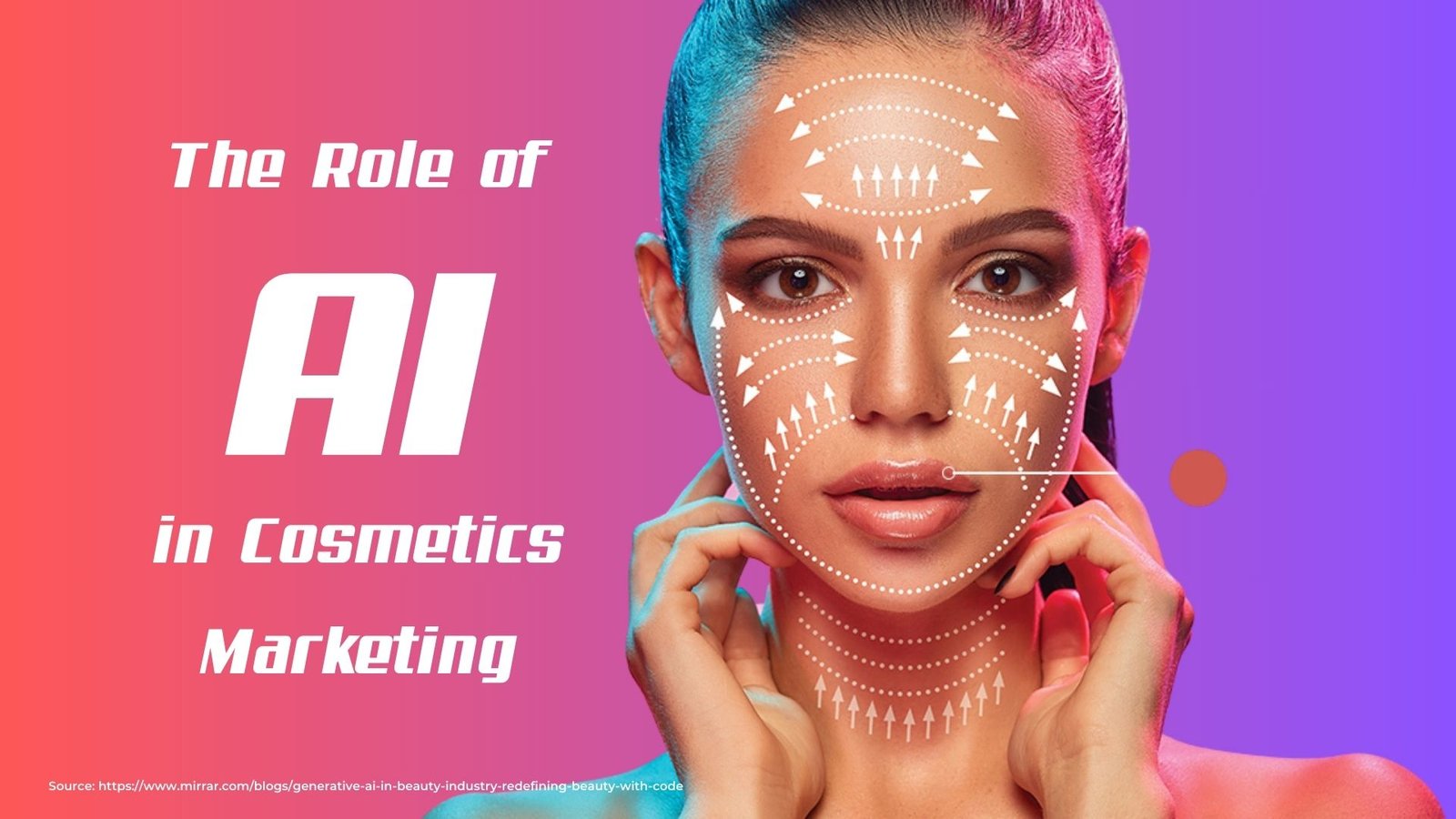AI in cosmetics marketing!!! Will it boost your cosmetic marketing quest? Get all the answers here.
In the ever-evolving landscape of marketing, artificial intelligence (AI) has emerged as a revolutionary tool, especially in the cosmetics industry.
With its ability to analyze vast datasets, predict consumer behavior, and personalize experiences, AI is transforming how cosmetic brands interact with their customers.
This guide aims to provide a comprehensive understanding of how AI can be leveraged in cosmetics marketing, particularly for those who are new to this technological advancement.
Understanding AI in the Context of Cosmetics Marketing
Before delving into the specifics, it’s crucial to understand what AI entails.
AI refers to computer systems or machines that mimic human intelligence to perform tasks and can iteratively improve themselves based on the information they collect.
In cosmetics marketing, AI can be used for a range of applications from personalized product recommendations to virtual try-on tools, thereby enhancing customer engagement and sales.
1. The Rise of Personalization
One of the key strengths of AI in cosmetics marketing is its ability to create highly personalized experiences for consumers.
AI algorithms can analyze customer data such as past purchases, skin types, color preferences, and even facial features, to recommend products that are uniquely suited to individuals.
This level of personalization not only improves the customer experience but also boosts loyalty and sales.
2. Enhanced Customer Insights
AI tools can process and analyze vast amounts of data to glean consumer behaviours and preferences insights.
These insights are invaluable for cosmetics brands looking to tailor their marketing strategies, develop new products, or enter new markets.
By understanding customer needs better, brands can make more informed decisions that resonate with their target audience.
3. Interactive and Immersive Experiences
The cosmetics industry thrives on the visual appeal and experiential nature of its products.
AI-powered tools like augmented reality (AR) virtual try-ons allow customers to see how products would look on them before making a purchase.
This not only enhances the online shopping experience but also reduces the likelihood of returns and dissatisfaction.
Implementing AI in Your Cosmetics Marketing Strategy
1. Starting with Data

The foundation of any successful AI implementation is data. Collecting and organizing customer data is the first step.
This includes demographic information, purchase history, online behavior, and even social media interactions.
Ensuring data quality and privacy is also crucial to maintaining customer trust.
2. Choosing the Right AI Tools

The market offers a wide variety of AI tools and platforms, each with its unique functionalities.
In the field of cosmetics marketing, it’s essential to concentrate on tools that provide personalized product recommendations.
Additionally, prioritize AI-driven platforms that specialize in content creation.
Chatbots are also crucial for efficient customer service in this sector.
Moreover, AR technology for virtual try-ons is increasingly important in the cosmetics industry.
When selecting these solutions, it’s vital to ensure they integrate seamlessly with your current systems.
Equally important is choosing tools that align with your specific marketing objectives in cosmetics marketing.
3. Building a Skilled Team

Implementing AI requires a certain level of expertise.
You’ll need a team that not only understands AI technology but also knows how to apply it effectively in the context of cosmetics marketing.
This might involve training your current team or hiring new talent with the requisite skills.
4. Testing and Learning

AI in cosmetics marketing is not a ‘set and forget’ solution.
It requires continuous testing, learning, and optimization.
Start with small-scale pilots to understand how AI can best be applied in your context.
Use the insights gained from these tests to refine your approach and scale up gradually.
5. Measuring Success

Determining the effectiveness of your AI initiatives is key to understanding their ROI.
Metrics such as engagement rates, conversion rates, customer satisfaction scores, and sales figures can provide a clear picture of how AI is impacting your marketing efforts.
Ethical Considerations
In the realm of cosmetics marketing, ethical considerations play a crucial role.
The application of AI must align with moral principles and respect individual rights. This involves:
1. Consumer Privacy: The use of AI in cosmetics marketing demands a rigorous approach to consumer privacy.
Brands must be transparent about how they collect, use, and store consumer data, adhering to regulations like GDPR.
They need to ensure that data is secure and used responsibly, maintaining the trust of their consumers.
2. Bias in AI Algorithms: A significant challenge in cosmetics marketing is the potential for bias in AI algorithms.
It’s imperative to ensure these algorithms are inclusive, avoiding stereotypes based on race, gender, age, or body type.
Continuous efforts are needed to identify and rectify biases, ensuring fairness in AI-driven recommendations and services.
3. Transparency and Accountability: In cosmetics marketing, there should be clear communication about the role of AI in decision-making processes.
This includes being open about the data driving these decisions and establishing accountability for any negative impacts resulting from AI decisions.
The Future of AI in Cosmetics Marketing
The future of AI in cosmetics marketing is bright, with ongoing advancements heralding a new era of innovation and customer engagement.
The evolving landscape suggests several key developments:
1. Hyper-Personalized Experiences: AI in Beauty marketing is set to offer even more tailored experiences, considering individual-specific factors like skin concerns, environmental conditions, and potentially genetic data.
2. Advanced Virtual Try-On Technologies: The integration of AI in cosmetics marketing will enhance virtual try-on technologies, making them more accurate and extensive, covering a broader range of products including skincare and hair care.
3. Sophisticated Chatbots and Voice Assistants: The future of AI in cosmetics marketing includes more advanced chatbots and voice assistants, capable of offering personalized advice and conducting detailed skin analyses through intuitive conversational interfaces.
4. Sustainable Product Development: AI in cosmetics marketing can play a key role in producing sustainable and ethical products.
AI’s predictive capabilities can help in minimizing waste and assessing the environmental impact of products.
5. AI-Driven Content Creation: AI in cosmetics marketing will further refine content creation, tailoring it to consumer preferences and behaviors for more engaging and relevant brand interactions.
6. Enhanced Market Insights: The role of AI in cosmetics marketing will expand in its ability to analyze market trends and consumer behavior, providing invaluable insights for future product and marketing strategy development.
As cosmetics marketing continues to evolve, it brings a host of benefits that can transform the industry.
However, this advancement must be balanced with a commitment to ethical practices, ensuring that the benefits of AI are enjoyed responsibly and respectfully.
In conclusion, as AI technology advances, it’s set to offer unparalleled benefits in cosmetics marketing.
However, this journey must be navigated with a strong commitment to ethical practices, ensuring that the advancements in AI benefit consumers and society as a whole, without compromising individual rights and values.
Conclusion
AI in cosmetics marketing represents a frontier brimming with potential!
For beginners, the journey of implementing AI can be challenging yet rewarding.
By understanding the basics, carefully selecting tools, focusing on data, and continuously learning and adapting, brands can effectively leverage AI to enhance their marketing strategies.
As we move forward, the integration of AI in cosmetics marketing will not just be a luxury but a necessity for those looking to stay ahead in the game.
In this journey, remember that AI is not just a tool but a partner in crafting more personalized, engaging, and successful marketing strategies in the cosmetics industry.
Are you ready to elevate your brand with the power of AI?
Dive into the world of AI in Beauty marketing and start your transformative journey today.
Embrace the future, personalize your customer experiences, and stand out in the competitive market
Contact us to unlock innovative AI strategies to take your brand to new heights.
This informative blog has been crafted by Rutuja Kadam from Trigacy, with due credit to the rightful sources for the images.






